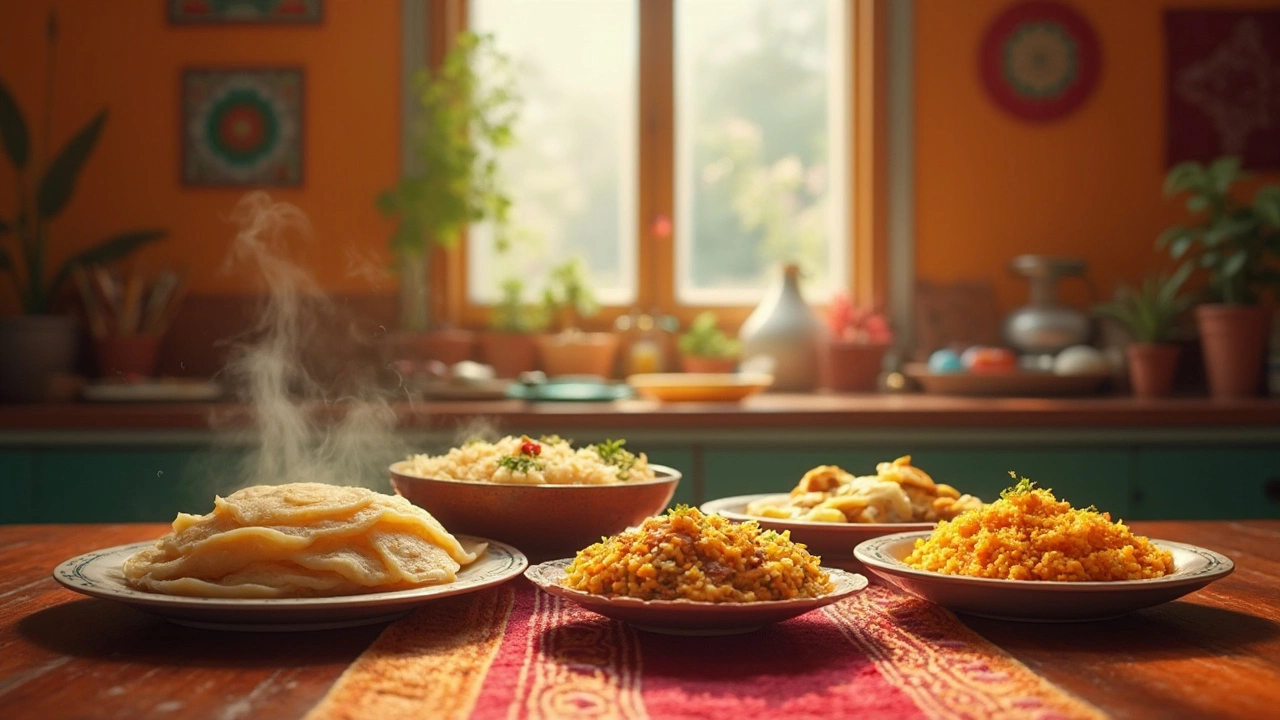Hinduism and the Culinary Landscape of India
When exploring Hinduism, the major religious tradition shaping Indian culture, philosophy, and daily life. Also known as Sanatana Dharma, it guides everything from moral values to meal choices, especially during rituals and celebrations. Hinduism influences Indian cuisine by encouraging vegetarian dishes, prescribing fasting rules, and linking specific foods to deities. For instance, the practice of offering prasad (sacred sweets) at temples creates a direct bridge between worship and the pantry.
Key Culinary Connections
One of the most visible links is between Indian cuisine, the diverse food system reflecting regional ingredients, cooking methods, and cultural rituals and Hindu festivals. During Diwali, families prepare deep‑fried sweets like laddus, while Navratri calls for grain‑free, vrat‑friendly meals. The vegetarian diet, a hallmark of many Hindu households, stems from the principle of ahimsa (non‑violence). This ethic fuels a rich array of plant‑based dishes—dal, paneer, and vegetable curries—that are both flavorful and nutritionally balanced. Vegetarianism, the avoidance of meat, often rooted in religious teachings also shapes food markets, prompting widespread availability of lentils, beans, and soy products.
Spices play a starring role in this cultural tapestry. The belief that certain spices have medicinal and spiritual properties leads to their ritual use—turmeric for purity, cumin for digestion, and asafoetida to ward off negative energies. These ingredients not only boost flavor but also reinforce the connection between body, mind, and devotion. By understanding how Hinduism, Indian cuisine, vegetarianism, and spices interact, readers can appreciate the deeper story behind each bite.
Below you’ll find a curated list of articles that dive into the science, techniques, and traditions behind these culinary practices. From mastering dosa batter with a pinch of soda to exploring the health benefits of vegetarian meals, the posts will equip you with practical knowledge rooted in cultural heritage. Ready to see how faith and food intertwine? Keep reading to discover tips, recipes, and insights that bring Hindu culinary wisdom into your kitchen.

Why Hindus Avoid Pork: Understanding Cultural Dietary Choices
In India, dietary customs vary significantly across different religions and communities. Among Hindus, pork consumption is generally avoided, influenced by cultural, religious, and historical factors. This article delves into reasons behind this dietary preference, shedding light on religious beliefs and health considerations. It also explores how these choices impact popular Indian breakfast options. Understanding these dietary practices can enhance cultural appreciation and help cater to diverse dietary needs.
- Chutney Recipes (13)
- General (11)
- Healthy Living (10)
- Easy Indian Recipes (9)
- Chicken Curry Recipes (9)
- Healthy Indian Snacks (8)
- Paneer Recipes (7)
- Dal Recipes (7)
- Street Food (7)
- Dosa Recipes (7)
-
Indian Sweets Recipes: What is the Tastiest Thing in India?
18 Apr 2025 -
Can I Make Paneer from Broken Milk?
4 Apr 2025 -
Why Indians Say ‘Tata’ Instead of ‘Bye’: Meaning, Origin & Usage
10 Oct 2025 -
Dairy-Free Vegetarian Indian Dishes: Flavorful Feasts
25 Jan 2025 -
When to Add Chopped Tomatoes to Curry: Chicken Curry Guide
28 May 2025
26.02.25
Kaia Binari
0